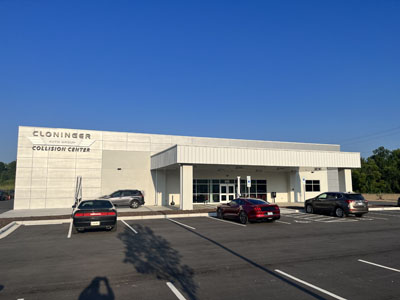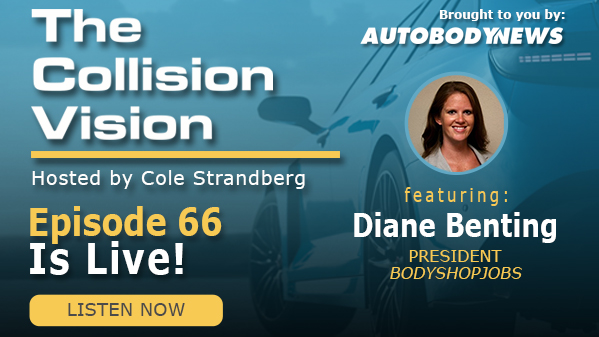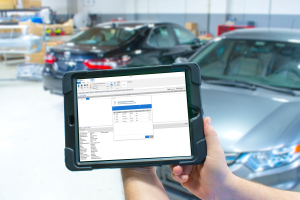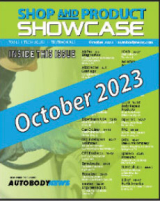DCR Systems, LLC, announced Aug. 2 that Cloninger Automotive Group based in Salisbury, NC, signed an area development licensing agreement with the company. The agreement provides access to DCR Systems’ full turnkey operating model.
“We appreciate Cloninger’s belief and trust in the DCR process and applaud their courage to adapt and transition from a traditional operation to lean-focused operation,” said Michael Giarrizzo, president and CEO of DCR Systems. “They have invested in a beautiful facility and a new way of doing things, and we are thrilled to partner with them on this venture.”
“We are so pleased to work with the Cloninger team,” added Cheryl Boswell, DCR Systems’ corporate CFO and managing partner. “Their culture of taking care of their customers and repairing vehicles the right way matches DCR’s culture. It is not easy to make change, but the Cloninger team has embraced DCR’s process and the results are showing.”
Cloninger Automotive Group is owned by Larry Cloninger and includes a collision repair facility in Salisbury and four dealerships. They include Cloninger Toyota in Salisbury, Ford dealerships in Salisbury, Hickory and Morganton, NC, and Florence Toyota in Florence, SC. The 38-year-old company has a total of 400 employees; 23 work in the body shop.
The collision repair facility operated on the dealership property in Salisbury since 1996. To help meet Ford’s and Toyota’s manufacturing requirements, the company decided to relocate the body shop to a 21,000-square-foot facility about a quarter mile away.
They visited several top-performing body shop models, including Mike Johnson's Hickory Toyota certified collision center, about 50 miles away and operated by DCR Systems.
“Their collision center operates in an approximately 12,000-square-foot space and they were doing more business than we were doing in our 18,000-square-foot space,” said Brad Tyson, president of Cloninger Automotive Group. “It was obvious that they were doing something from an efficiency standpoint that we were not.”
Soon after, Tyson met Giarrizzo and learned about the company’s two business models. DCR Systems can either operate a body shop on behalf of a dealership or the dealership can sign up for the DCR Systems turnkey licensing model, which includes business direction, support, training and accountability.
After deciding to move forward with the licensing model, DCR Systems helped implement DCR’s process in the Cloninger facility. The process includes establishing tools to track and monitor daily production and meet set targets.
“They were very hands-on with the way we laid out our shop, what tools we needed to buy and where we needed to place everything,” said Tyson.
Previously, technicians brought their tools to work. Now, Cloninger supplies what is necessary to do the job, which has helped with efficiency.
“They are very much in tune with understanding the challenges setting up processes---even the way we pay our staff---and have been able to help us through these changes,” said Tyson. “I'm confident that I wouldn't have been able to make the changes to their pay structure without the help of Michael Giarrizzo and DCR Systems."
Initially, Tyson was concerned because some employees left the company due to the change in pay structure. In hindsight, he found the change resulted in building a team of employees.
“The DCR Systems’ model is all about the team concept,” he said.
For example, if disassembly is backed up, a painter might come in to assist; if paint is backed up, a body man might help buff; and if the detail department is busy, the parts manager will wash the car.
Part of DCR Systems’ process involves the staff working together to identify the damage up front and create a repair plan.
“Everybody's involved with the car the first day it's in the shop and the whole time it's there,” said Tyson.
Communication is key. This includes letting guests know the expected repair time, encouraging them to communicate with their insurance company and providing a timeframe for delivery.
“Our team understands the responsibility of ensuring the vehicle is repaired accurately regardless of the time it takes to do it right,” said Tyson. “At the same time, we want to get the customer’s vehicle fixed as quickly and as efficiently as possible.”
After implementing the DCR Systems model, he said, “Everybody is so happy.”
“What is amazing to me is the people that I thought would struggle the most with this transition seem to be enjoying it the most,” he said.
In addition to DCR Systems sending their team to the shop for support, Cloninger employees receive cross-training from DCR Systems.
“We often send our people to Mike Johnson's collision center in Hickory and they'll send their people over to watch us work, too,” he said. “We train and learn side by side.”
Since the changes, Tyson has found production has increased with fewer people. “We averaged producing 68 cars and increased to 102 over the first 90 days,” Tyson said, adding they are continuing to increase efficiencies.
Using the accounting system provided by DCR Systems, Cloninger has set up a more effective billing process so customers and insurers are provided with costs.
“This cuts down on our supplements, which makes us more productive,” he said. “We can get more done because we're not having to do it multiple times.”
In addition, Tyson said DCR Systems has helped with their production quality. “By using their process, a safer vehicle is on the road and customers are happy,” he said.
For more information about the DCR Systems Licensing Model, visit the website or email Michael Giarrizzo at mgiarrizzo@dcrsystems.net.
Source: DCR Systems









